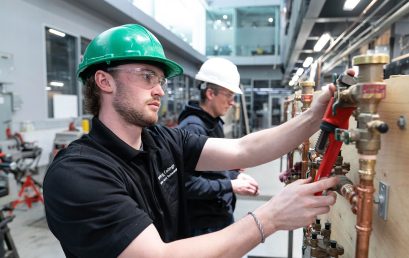Plumbing Apprenticeship: Your Step-by-Step Guide to a Fulfilling Career
Are you thinking about pursuing a career in the skilled trades? If so, a plumbing apprenticeship offers an excellent path to becoming a licensed plumber. Unlike traditional education routes, apprenticeships blend hands-on experience with classroom learning. You develop essential skills while earning a paycheck—a win-win. In this post, we’ll dive into what a plumbing apprenticeship involves, the benefits it offers, and how you can get started.
What Is a Plumbing Apprenticeship?
To begin with, a plumbing apprenticeship typically lasts around 4 to 5 years. During this time, you’ll work alongside licensed plumbers, gaining invaluable experience in the field. You’ll learn how to install and repair pipes, troubleshoot issues, and work on complex plumbing systems. Furthermore, you’ll handle drainage systems, water heaters, and much more, preparing you for the challenges you’ll face in the profession.
In addition to hands-on work, you’ll attend classes. These courses will cover important topics such as plumbing codes, blueprint reading, and safety regulations. This combination of practical experience and technical education ensures that you’ll be well-prepared to tackle real-world plumbing problems.
Why Choose a Plumbing Apprenticeship?
There are many reasons why choosing a plumbing apprenticeship is a smart move. Here’s why:
- Earn While You Learn: One of the greatest advantages is that you get paid while you train. As your skills grow, so does your paycheck. This makes it a financially sustainable option for those looking to avoid student debt.
- High Demand for Plumbers: Let’s face it—plumbing is essential. Homes, businesses, and industrial facilities all need plumbing systems installed and maintained. Because of this constant demand, plumbing jobs are secure and plentiful.
- Path to Licensing: After completing your apprenticeship, you’ll be qualified to take the journeyman plumber exam. Passing this test will grant you a license, allowing you to work independently or continue advancing your career.
- Opportunities for Growth: With your apprenticeship complete, you’ll have numerous opportunities for specialization. For instance, you might focus on pipefitting, green technologies, or management roles. Eventually, many plumbers even open their own businesses.
- Hands-On, Varied Work: If you enjoy solving problems and working with your hands, plumbing offers a diverse work environment. No two days will be the same, and every project brings new challenges, keeping the work fresh and interesting.
How to Get Started with a Plumbing Apprenticeship
Ready to kick off your plumbing apprenticeship? Here’s how to make it happen:
- Meet the Basic Requirements: Most programs require a high school diploma or GED. Strong skills in math, science, and technical drawing will give you an edge.
- Apply for an Apprenticeship: Plumbing apprenticeships are often offered by trade unions, contractors, or technical schools. Be prepared—some programs have a waiting list. In many cases, you’ll also need to pass an aptitude test covering math and reading comprehension. but, for more information i would reach out to a local community college like Bright Point to see what they have to offer.
- Complete the Program: Once accepted, you’ll work with licensed plumbers and take on increasing responsibilities. You’ll also attend classes, giving you a well-rounded education in the field.
- Earn Your Certification: After completing your apprenticeship, you’ll be ready to take the journeyman plumber exam. Once you pass, you’ll be a fully licensed plumber, ready to take on projects independently or explore further certifications.
Why Now Is the Perfect Time for a Plumbing Apprenticeship
Now more than ever, the plumbing industry is evolving with new technologies, including smart plumbing systems and environmentally friendly practices. As an apprentice today, you’ll learn cutting-edge techniques and stay on the forefront of industry trends. Moreover, with the construction and home improvement industries booming, the demand for skilled plumbers is skyrocketing. This makes it the perfect time to start your apprenticeship journey.
Final Thoughts
A plumbing apprenticeship is more than just a job—it’s the start of a stable, well-paying career. You’ll develop in-demand skills, avoid the burden of student debt, and enjoy a wide range of career growth opportunities. Whether you’re just starting out or considering a career change, plumbing offers the perfect combination of hands-on work and long-term potential.
So, what are you waiting for? Start exploring local plumbing apprenticeship programs today and take the first step toward a rewarding career!


